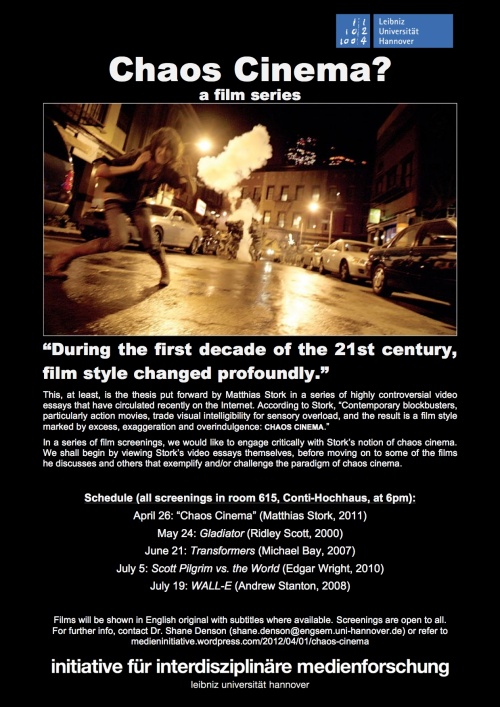Here’s the course description for a graduate-level course I’ll be teaching in the winter semester (October 2013 – February 2014) — a PDF of the full syllabus is embedded above:
Digital Film, Chaos Cinema, Post-Cinematic Affect: Thinking 21st Century Motion Pictures
Instructor: Shane Denson
Course Description:
In this seminar, we will try to come to terms with twenty-first century motion pictures by thinking through a variety of concepts and theoretical approaches designed to explain their relations and differences from the cinema of the previous century. We will consider the impact of digital technologies on film, think about the cultural contexts and aesthetic practices of contemporary motion pictures, and try to understand the experiential dimensions of spectatorship in today’s altered viewing conditions. In addition to preparing weekly readings, students will be expected to view a variety of films prior to each class meeting.
Course Themes and Objectives:
In this course, we set out from the apparent “chaos” that contemporary cinema often presents to us: the seemingly incoherent and unmotivated camerawork and editing, for example, by which many action films of the twenty-first century mark their departure from the “classical” norms of Hollywood-style narration and formal construction. From here, we seek to make sense more generally of cinema’s transformation in terms of new technologies and techniques (e.g. digital imaging processes, nonlinear editing, and attendant editing styles), in terms of new modes of cinematic distribution and reception (e.g. DVD, Blu-Ray, and streaming services, HD TVs, smartphones, and tablet computers, but also IMAX 3-D and similar transformations of the big screen), in terms of non-classical narrative styles (e.g. recursive, database-like, non-linear, and even non-sequitur forms of storytelling), and in terms of broader phenomenological and environmental shifts that inform our experience, our embodiment, and our subjectivity in the digital era.
Several key concepts will help to orient our thinking about twenty-first century cinema and its relation to earlier cinematic modes. The first is “chaos cinema,” a term which Matthias Stork popularized in a compelling set of video essays focused particularly on recent action cinema; beyond this context, however, Stork’s notion of “chaos” resonates with the feelings and fears of many critics and theorists in the face of digital-era cinema. This broader perception of chaos is sometimes traced back to the digital unmooring of images from the indexical referents to which photographic films remained tied; on this basis, the somewhat oxymoronic term “digital film” is often linked to an even more unsettling, because more basic, sense of chaos: according to some critics, the digital (and the moving images it produces and supports) is correlated with a sweeping transformation of human society and subjectivity itself. On the other hand, though, not all critics are similarly alarmed by digital-era chaos. David Bordwell’s concept of “intensified continuity” effectively denies the radical stylistic break announced in Stork’s analysis; Bordwell sees the newer films as perhaps faster and even more hectic than classical Hollywood fare, but basically constructed according to principles of classical continuity – just intensified. By way of contrast, Steven Shaviro’s notion of “post-continuity” – developed in the context of his analysis of “post-cinematic affect” – provides another view of contemporary moving image culture, one which links formal and aesthetic transformations not only with new technologies but also with broader social, cultural, and economic changes underway right now.
As we think through these and related concepts, we will engage a variety of recent movies from formal, phenomenological, affective, cultural, and environmental perspectives. We will seek to understand whether a radical change has taken place in recent cinema, to assess what its significance might be, and in this way begin to think through the implications of and for our viewing habits in the twenty-first century.
You can find more of my syllabi here: http://uni-hannover.academia.edu/ShaneDenson
